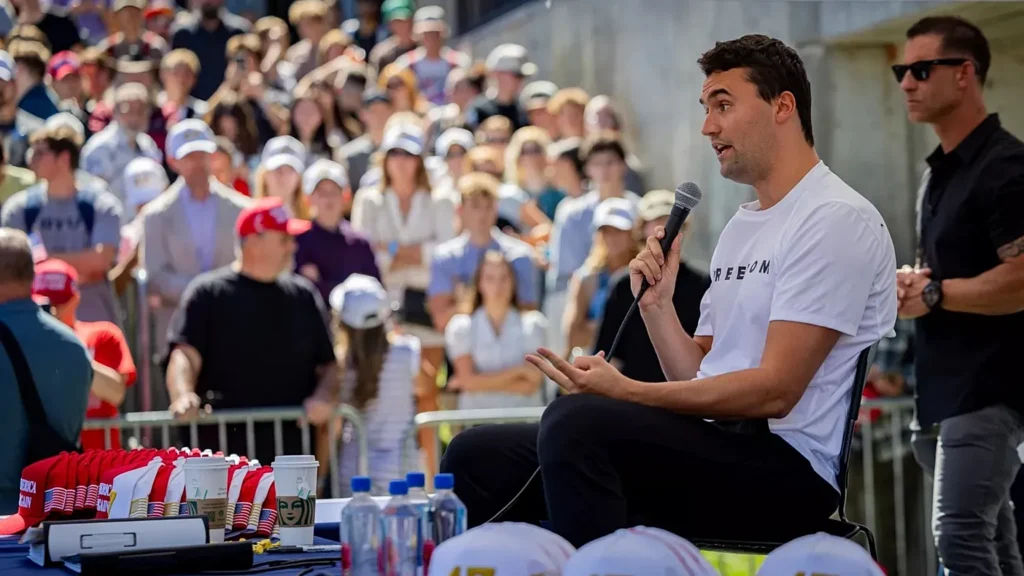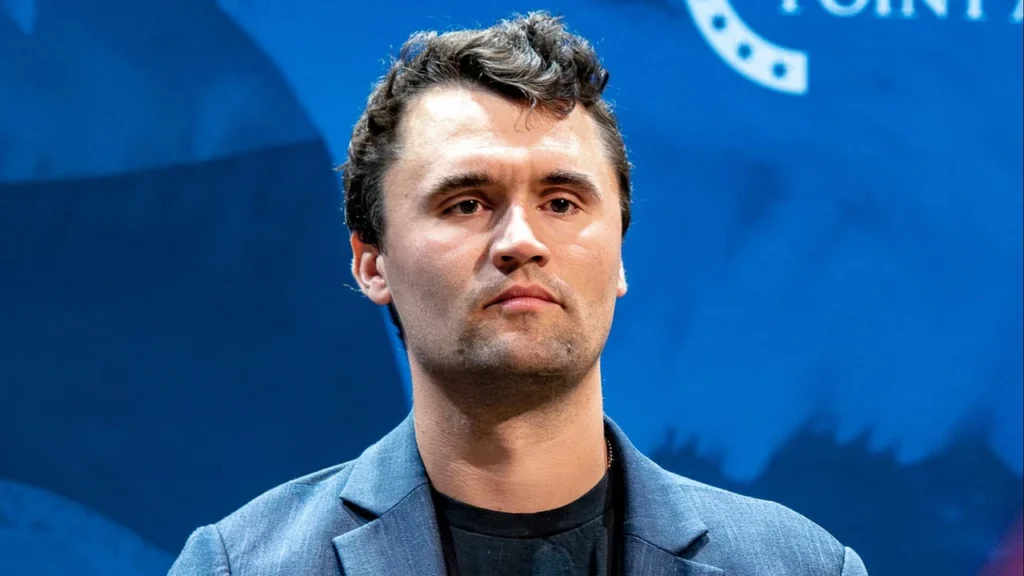By YTC Ventures
Technocrat Magazine
September 11, 2025
The Incident
The fatal shooting of conservative activist Charlie Kirk at Utah Valley University yesterday serves as a stark indictment of the United States’ antiquated and inefficient governance structures. Kirk, a 31-year-old firebrand and co-founder of Turning Point USA, was gunned down in the neck during a public speaking event, an incident that Utah Governor Spencer Cox has labeled a “political assassination.” This tragedy not only claims the life of a prominent Trump ally who mobilized millions of young voters for the Republican cause but also exposes the profound vulnerabilities in a system ill-equipped to harness data-driven solutions for preventing such acts of violence.

The incident unfolded around 12:20 p.m. local time at an outdoor amphitheater on the Orem campus, home to nearly 47,000 students. Kirk, known for his unyielding advocacy on issues like immigration enforcement, opposition to gun control, and skepticism toward climate initiatives, was mid-debate—responding to a question on crime statistics—when a single gunshot rang out from what investigators believe was a rooftop position.
Cellphone footage captured the chaos: Kirk clutching his neck as blood flowed, the crowd scattering in panic, and emergency responders rushing to the scene. He was pronounced dead shortly thereafter, prompting President Donald Trump to lower flags to half-staff nationwide and vow a federal manhunt for the perpetrator and any enablers.

Charlie Kirk’s Career and Influence
Born on October 14, 1993, in the Chicago suburb of Prospect Heights, Illinois, Charlie Kirk’s career as a conservative activist began in earnest during his high school years at Wheeling High School. Rejecting a full scholarship to the University of Colorado Boulder, Kirk deferred his education to focus on political organizing, a decision that propelled him into the national spotlight. In 2012, at just 18 years old, he co-founded Turning Point USA (TPUSA) with Bill Montgomery, initially as a student organization aimed at promoting free-market principles, limited government, and constitutional conservatism on college campuses. Under Kirk’s leadership as CEO and Executive Director, TPUSA expanded rapidly, growing to over 3,000 high school and college chapters across all 50 states by 2025, with an annual operating budget exceeding $100 million, much of it fueled by high-profile donors like the Koch brothers and Foster Friess.
The organization’s events, such as the annual Student Action Summit, drew tens of thousands of attendees, including speeches from figures like Donald Trump, Ben Shapiro, and Candace Owens.Kirk’s influence extended far beyond campus activism. He became a fixture in conservative media, hosting the nationally syndicated radio show The Charlie Kirk Show, which by 2025 boasted over 500 affiliates and a podcast audience of nearly six million monthly listeners. His authorship of bestsellers like Campus Battlefield (2018), The MAGA Doctrine (2020), and Right-Wing Revolution (2023) further solidified his status as a thought leader in the MAGA movement. Kirk played a pivotal role in Trump’s political ecosystem, serving as an advisor to the 2016 and 2020 campaigns and founding Turning Point Action in 2021 to focus on voter mobilization and election integrity efforts. In the lead-up to the 2024 election, TPUSA’s ground game helped register over one million new voters, contributing to Trump’s reelection victory.

Financial Success
Kirk’s personal net worth, estimated at $12 million as of 2025, stemmed from his nonprofit salaries (reportedly over $500,000 annually from TPUSA), book deals, speaking fees averaging $50,000 per event, and investments in media ventures. Despite his youth, Kirk’s career trajectory marked him as one of the most influential conservative voices of his generation, often compared to a modern-day William F. Buckley Jr.
Political and Social Impact
Kirk’s death reverberates through the political landscape. As CEO of Turning Point USA and Turning Point Action, he was instrumental in galvanizing youth support for Trump’s 2024 reelection, channeling millions in funding to voter turnout efforts on campuses and in communities. His podcast amplified conservative narratives on everything from election integrity to cultural preservation.
Tributes poured in from across the spectrum: Vice President JD Vance called him a “genuinely good guy and young father,” while even former President Barack Obama decried the “despicable violence” that has no place in democracy. Yet, beneath the condolences lies a deeper malaise—one that technocratic reform must address.
Systemic Failures in Security
From a technocratic perspective, this assassination underscores the inefficiencies plaguing America’s fragmented security apparatus. Despite billions invested in surveillance technologies, predictive analytics, and AI-driven threat detection, the U.S. remains mired in a patchwork of federal, state, and local agencies operating in silos. The FBI, under Director Kash Patel, has mobilized to the scene, but early reports indicate that two detained individuals were released after questioning, with the manhunt expanding amid reviews of security footage showing a suspect in dark clothing firing from afar. Why did existing campus surveillance systems—equipped with facial recognition and anomaly detection algorithms—fail to flag the shooter?

Why was there no real-time integration of social media monitoring to identify potential threats, given the polarized online rhetoric surrounding Kirk’s visit? An online petition by some students to block his appearance highlighted campus divisions, yet no predictive modeling was deployed to assess risks.Reuters has documented over 300 politically motivated violent acts since the January 6, 2021, Capitol riot, marking the most sustained period of such unrest since the 1970s. This is not mere coincidence but a failure of systemic design.
Technocracy advocates for centralized, evidence-based governance: Imagine a national AI platform aggregating data from social feeds, geolocation tracking, and behavioral analytics to preempt threats with 95% accuracy, as demonstrated in pilot programs in Singapore and Estonia. Instead, U.S. policy remains beholden to partisan gridlock, where ideological debates over privacy eclipse pragmatic implementation of tools like blockchain-secured threat databases or drone-assisted perimeter monitoring.
The Path Forward
Kirk’s own stances—opposing DEI policies, gender-affirming care, and climate action—fueled the very polarization that now endangers lives. Yet, technocracy transcends ideology; it prioritizes outcomes. His death, following the 2024 attempt on Trump’s life and other high-profile attacks, demands a reckoning. President Trump’s rhetoric blaming the “radical left” and promising to root out funding sources for violence is understandable but insufficient. What is needed is a meritocratic overhaul: Appoint experts in data science and cybersecurity to lead a unified Department of Predictive Security, bypassing the inefficiencies of elected officials beholden to donors and voters.

The implications extend beyond this tragedy.
With Trump’s administration pushing National Guard deployments to urban centers amid rising crime, Kirk’s killing provides political impetus for expanded executive powers—potentially including AI-monitored curfews or automated border surveillance. But without technocratic safeguards, such measures risk overreach. Estonia’s e-governance model, for instance, balances surveillance with transparent algorithms, ensuring accountability while preventing abuses.
Conclusion
As the manhunt continues and the nation mourns, let Kirk’s assassination be the catalyst for change. America possesses the technology to forge a safer, more rational society—one where political discourse thrives without the shadow of violence.
The time for expert-led reform is now; anything less dishonors the dead and endangers the living.

Comments